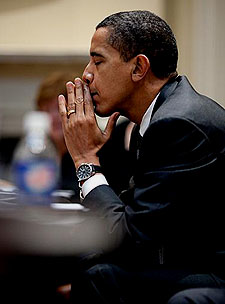Was Barack Obama a naive waif who came to Washington untested and unready, and then struggled to control his White House staff? That’s the portrait Ron Suskind paints, and to a certain extent I imagine it’s true. In fact, I imagine it’s true of every president. There’s just no training position for the presidency, and no one walks into the job fully prepared.
But that said, how does Obama compare to other presidents? After all, every White House features plenty of chaos, plenty of policy dysfunctionality, and lots of interpersonal feuds (remember all the stories about  Condi Rice vs. the alpha male Cheney/Rumsfeld/Libby/Addington pack?). Jonathan Alter suggests that Suskind’s portrayal is a wee bit overblown:
Condi Rice vs. the alpha male Cheney/Rumsfeld/Libby/Addington pack?). Jonathan Alter suggests that Suskind’s portrayal is a wee bit overblown:
I have a whole chapter in my book where I talked to all the former Clinton people who now work for Obama. I asked them all, compare Clinton and Obama….They thought Clinton was more creative and his policymaking, but they prefer to a person Obama in a crisis, which was what they were in. He was decisive and making as many decisions in a week as Bill Clinton made in a year, and making the decisions crisply. The idea that somehow all the former Clinton officials working for Obama were longing for Bill Clinton because they had this inexperienced president who didn’t know what he was doing is not what they were saying at the time. I was talking to not just a few, but pretty much all of the former Clinton people in the White House at high and mid-levels.
I don’t doubt for a second that Obama struggled with the demands of managing an enormous crisis from the first day he stepped into the Oval Office. At the same time, I suspect that a lot of what people are interpreting as indecisiveness or inexperience is really something different: it’s the fact that Obama agreed with the “wrong” advisors. They’re reading about all the internal debates, noting that Obama eventually came down on a side they consider preposterous, and concluding that he got steamrolled. But as Karl Smith says, the more likely explanation is simply that Obama doesn’t agree with them:
We observe a President not pushing for more stimulus and not appointing doves to the FOMC. What could be the reason? You could come up with all sort of theories involving intrigue and political strategery. However, here is one you might want to try: the President doesn’t want to do stimulus and is not interested in appointing doves to the FOMC.
Indeed, if I observe a person who cannot communicate — my baby for example — trying to avoid a situation, I am likely to conclude “Charlie does not want to do that.” I think this is generally sound reasoning.
There are, of course, political considerations always at work. On additional stimulus, for example, it’s clear that Obama thought it was politically impossible and therefore not really worth debating at length on a policy level. More broadly, though, he just came down more often on the side of Geithner and Orszag than of Romer and Summers. That may have been a mistake, but it doesn’t mean he got steamrolled. It just means that he was genuinely persuaded that the deficit is a problem that needs to be seriously addressed.













